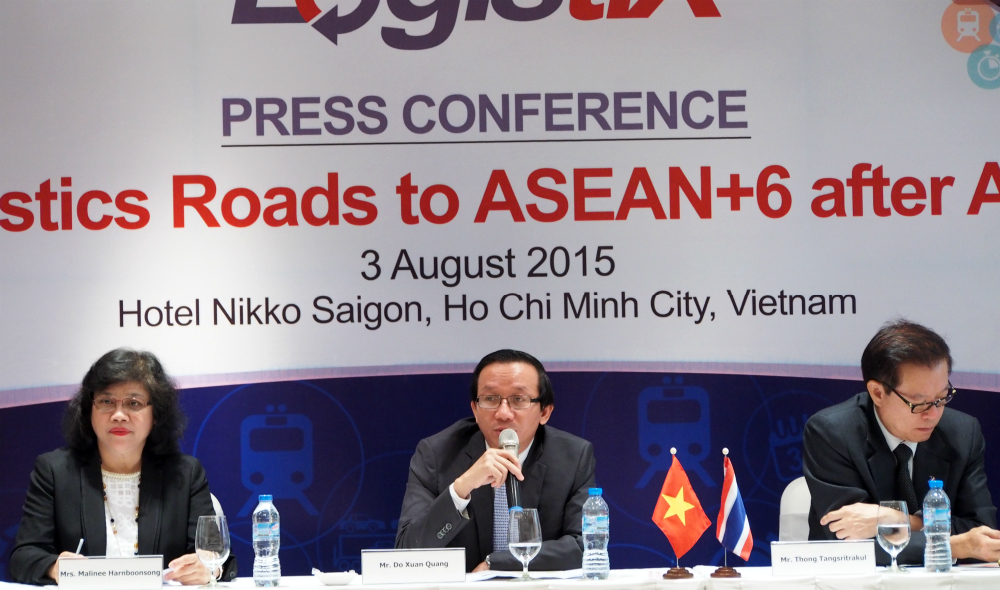Multinational logistics enterprises take most of the market share in providing logistics services in Vietnam, while local firms have to compete fiercely for the remaining, an expert said at a workshop in Ho Chi Minh City on Monday.
Twenty-five foreign logistics companies get 80 percent of the market share, Do Xuan Quang, chairman of the Vietnam Logistics Business Association (VLA), said at the “Logistics Road to ASEAN+6 after AEC” conference.
The remaining 20 percent sees fierce competition from more than 1,300 domestic logistics firms, Quang added.
Annual logistics expenses in Vietnam, covering the costs of transport, storage, warehousing, customs procedures and other paperwork, account for approximately 21-25 percent of the country’s gross domestic product (GDP), or around US$37-40 billion, the chairman elaborated.
However, about $30-35 billion is pocketed by foreign firms, Quang said.
Vietnamese logistics businesses have seen rapid development in the last two decades, from a few to tens of thousands currently.
But their weaknesses have remained unchanged during this 20-year course, including small size and limitations in technology and capital.
On average, the capital of one Vietnamese logistics enterprise is only VND 6-7 billion ($276,000-322,000).
With such a modest amount of capital, it is very hard to build a standardized warehouse, which often costs around $1 million, or to develop trucking networks and to build large transport vessels.
As a result, local businesses have had to undertake simple jobs like loading/unloading and counting goods, or work as agents and subcontractors for foreign firms, Quang said.
In addition, though Vietnam has seen fast-growing investment in seaports, airports, rail and road infrastructure in recent years, connectivity between these places is still limited due to existing weaknesses in the road networks and other storage facilities, he said.
There are seaports built without access to roads and warehousing services, Quang pointed out.
This is not including customs procedures and costs emerging from under-the-table money, which causes expenses to rise and delivery to take longer, he added.
Also, the practice of buying and selling goods from Vietnamese exporters and importers enables foreign partners to designate foreign shipping firms to handle the job instead of picking local enterprises.
While exporters often choose FOB (free on board) prices when trading, importers prefer purchasing merchandise with CIF (cost, insurance and freight) prices, all of which offers the foreign sellers and buyers a chance to freely choose the shipping lines they want to, he said.
Rough seas ahead
In late 2015, Vietnam will officially join the ASEAN Economic Community (AEC), and ASEAN + 6 in the future.
This, along with the Trans-Pacific Partnership (TPP), means Vietnam’s logistics sector faces the risk of being fully dominated by foreign companies, Quang said.
To avoid this scenario, local logistics firms should establish joint ventures between themselves or with foreign firms, the chairman said.
Exporters and importers should also help by choosing local firms for logistics services.
But most importantly, domestic firms must provide adequate service, good quality, reasonable prices and fast delivery times, which will help them gradually win over both local and foreign exporters and importers, he added.Cooperation opportunities Also at the conference, Vietnamese and Thai experts discussed the strengthening of cooperation between the logistics sectors of Vietnam and Thailand. On promoting the competitiveness of the logistics industry in ASEAN + 6, which includes ASEAN and six countries – South Korea, Japan, China, Australia, New Zealand and India - Quang said that in the years to come ASEAN will be a key development area for global transport and logistics. When managed effectively, the regional logistics sector will help reduce the cost of transportation of goods throughout the region, shape faster and more efficient transport routes, and contribute greatly to the development of the ASEAN economies. Thong Tangsritrakul, vice president of the Thai Federation of Logistics, emphasized that connection is the key to success for boosting competitiveness in the logistics sector of the ASEAN +6 countries. "When we are interested and willing to connect, everything will be done more rigorously," he added.
Like us on Facebook or follow us on Twitter to get the latest news about Vietnam!


















































